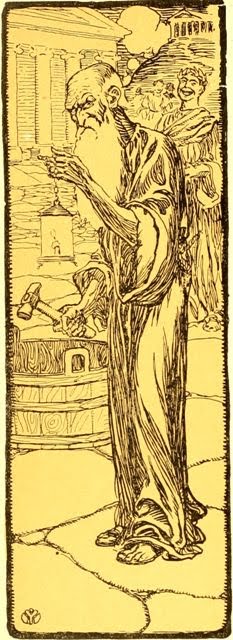
Diogenes lived in a tub
His fellows analyzing;
These words were carved upon his club:
“First Class Philosophizing.”
If any question came his way
Involving people’s morals,
The things that he felt moved to say
Were sure to start some quarrels.
In fact, his tub became a booth
In which he dealt in wholesale truth.
This world was but a fleeting show—
He knew a lot about it;
When he was told a thing was so
He then began to doubt it.
He seldom left his narrow home—
Not even on a Sunday;
The only time that he would roam
Abroad was on a Monday.
He had to roam then, anyway,
For that, you know, is washing day.
Society, with all its sham,
Gave him a paroxysm;
He always spoke in epigram
And thought in aphorism.
One day he took his lantern down
And polished it and lit it—
But first he frowned a peevish frown
And growled: “The wick don’t fit it.”
And then, with pessimistic scan,
He sought to find an honest man.
Diogenes has long been dead;
His search was not well heeded,
For no historian has said
If ever he succeeded.
But there’s this thought for you and me:
It would not be quite pleasant
If on that quest the sage should be
With his fierce light, at present.
For, if he were, one may but think
How much that light would make him blink.